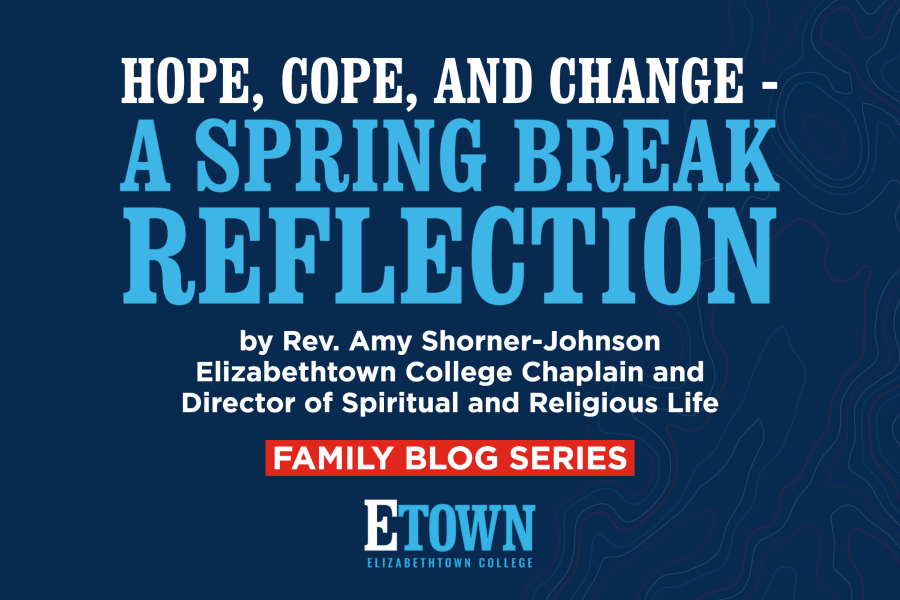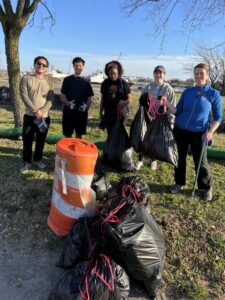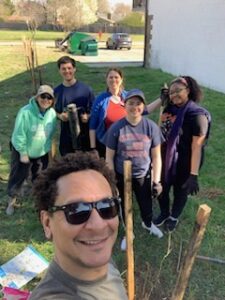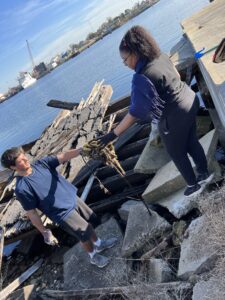The collegiate experience is often a period of excitement and apprehension – for both students and parents. In our Family Blog Series, we’ll hear about this life-changing journey from current Blue Jays, as well as impart guidance on the process from our supportive Elizabethtown College employees.
We often mark our impact by numbers, demonstrating success in terms of people and hours. If I were to tell the story of our spring break in numbers, five members of the Elizabethtown College community traveled down the Chesapeake Bay for five days. Along the way, we planted 17 trees, picked up 90 pounds of garbage, and engaged with three rivers and the communities that care for them. We visited two communities of faith and three agencies that help their neighbors cope with the water running through their backyards. We toured the Brock Environmental Center, built with the imagination of the Chesapeake Bay Foundation, which produces 80% more energy than it uses.
I love the numbers, but numbers often only tell one side of a story. The deeper conversation woven throughout our journey was about “Hope, Coping, and Change,” and the questions and interactions that sustain us when the tasks we face feel out of our control when addressing climate change. We also made a point to focus on building connections, as people who live on the north end of the Chesapeake Watershed, by visiting those who live downstream from our Etown Community.
Our conversations with Riverkeeper, Fred Tutman, was a wonderful start to demonstrate the power of small noticings making a huge impact by helping to keep companies honest when it comes to caring for the water. We worked with both the Elizabeth River Project and Lynnhaven River Now to see how everyday actions can bring a failing river back to life. We were able to ask congregations who deal with community flooding about what allows them to stay grounded in hard work, when injustice is widespread and measures of change are incremental. We learned that hope is like a muscle, strengthened with practice, and while often touted as idealism, is actually grounded in what is possible. Visiting the Brock Environmental Center and the bay, I felt our whole group shift to reimagining what our choices could do and how they can impact those around us.
Being able to hear water, observe it, and wonder at its power and life-giving capabilities was an essential part of the trip. Every person we spoke with could talk about their relationship with water and desire to care for the connection that kept them enlivened. The impact of connection and the spiritual connections is not so easily measured but Dacher Keltner and Lisa Miller, acclaimed professors of psychology, are finding that the science of awe and spiritual connection, often found in nature as well as in religion and spiritual rituals, are not only both rich but literally life-giving.
We capped our time focused on this awe and reflection on what changed in us, and while we may still be unearthing the answers to that question, I know that asking is one of the most important tasks ahead as we work to hope, cope and change our relationship with the beautiful world around us.
Amy Shorner-Johnson is Chaplain and Director of Spiritual and Religious life at Elizabethtown College. Spring break trips connecting spirituality to other issues of justice and meaning for the past 13 years have been among her favorite experiences with the incredible students of Etown.





